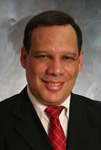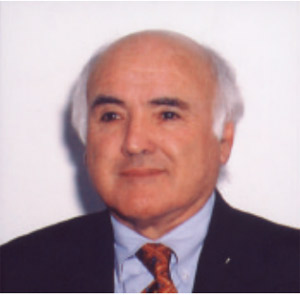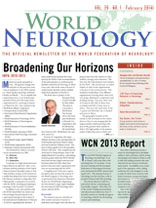By Marco T. Medina, Dean of the National Autonomous University of Honduras

Marco T. Medina
The World Federation of Neurology (WFN) lost an outstanding leader on Nov. 22, 2013, with the death of Professor Theodore Leon Munsat (“Ted”), in Waltham, Mass., U.S., at age 83.
Munsat was Emeritus professor of Neurology at Tufts University School of Medicine and served the WFN in several capacities as trustee, chairman of the WFN Education and Research Committees, chairman of the WFN ALS Research Group and founding director of the WFN Seminars in Clinical Neurology. He was president of the American Academy of Neurology (AAN) 1989-1991, chairman of the Continuing Educational Committee of the AAN and founding director of AAN’s premier continuing medical education journal Continuum: Lifelong Learning in Neurology1, 2.
Munsat was born in Portland, Maine, in 1930, to Leo and Ethel Munsat. When he was a child, the Munsat family moved to Rutland, Vt. He graduated from Rutland High School in 1948. He received his BA degree in chemistry at the University of Michigan, and in 1957, his MD degree from the University of Vermont, and then completed an internship at Mt. Sinai Hospital in New York, followed by a neurology residency with Houston Merritt at the New York Neurological Institute, Columbia Presbyterian Medical Center. He completed his training with Augustus S. Rose at the University of California in Los Angeles (UCLA). After serving in the Navy for two years, he returned to UCLA in 1963 as assistant professor of Neurology and director of the Muscular Dystrophy Clinic where he worked with Carl Pearson. In 1970, he moved to the University of Southern California, first as associate professor, and then, in 1973, as professor of Neurology. In 1975, he took a 12-month sabbatical in Newcastle upon Tyne, U.K, with Lord Walton. In 1976, he became chairman of Neurology at Tufts University and the New England Medical Center1.
He was a worldwide leader in ALS research and as chairman of the WFN ALS Research Group that published important international diagnostic guidelines. He authored more than 200 scientific articles and books, including classic texts as Amyotrophic Lateral Sclerosis: A Guide for Patients and Families, Post-Polio Syndrome and Quantification of Neurological Deficits. He received many honors during his long career, including the A.B. Baker Award for Education of the AAM, the Sheila Essey Award for ALS Research, the Lifetime Achievement Award of the WFN Research Group on Neuromuscular Diseases and the degree of Doctor of Medicine, Honoris Causa, by the University of Marseilles1.
Munsat as the WFN chairman of the Education Committee developed a number of successful educational programs around the world:

Ted Munsat
- A continuing medical education (CME) program using the journal Continuum, generously donated by the American Academy of Neurology, and the WFN Seminars in Clinical Neurology. More than 42 developing countries participated in this program, including Argentina, Bangladesh, Brazil, Bulgaria, Cameroon, Chile, Columbia, Congo, Croatia, Cuba, Cypress, Czech Republic, Egypt, Ethiopia, Guatemala, Honduras, Hungary, India, Iraq, Jordan, Kenya, Lebanon, Lithuania, Macedonia, Mexico, Mongolia, Nigeria, Panama, Peru, Romania, Russia, Serbia, Slovenia, Sri Lanka, Syria, Tunisia, Uganda, Uruguay, Vietnam, Venezuela, Yemen, and Zambia with an extraordinary local impact3-7.
- Support for Neurologic Training program and WFN Certification: Munsat founded programs for the WFN to provide assistance in establishing neurology training programs where there were none, helping further develop existing programs and providing a certification process for programs that wished to have an external review. He worked with programs in Ethiopia, Honduras, Guatemala, Mexico, Peru, etc.3,5,8.
The first pilot program was the Honduras Neurology Training (HNT) Program. Munsat and Professor Alberto Portera Sanchez from the WFN Education Committee visited Honduras in July 1998 for the first time, and after an evaluation, they concluded: “It is our recommendation that a training program in neurology should be established at the Hospital Escuela. We believe that there is a pressing need for more neurologists to address the unmet health needs of the people of Honduras. The relevant members of the medical school faculty have expressed their strong support of such a program. More than adequate human and structural facilities are currently available. There is no reason why this program could not be a program of unqualified excellence and effectiveness.”
After the initial visit, the National Autonomous University of Honduras established the country’s first Neurology Training Program in 1998. This program was established using a problem- and epidemiological-oriented methodology with oversight by an external WFN review board. By 2013, the program resulted in a 50 percent increase in the national neurologist ratio per inhabitant, significantly improving the quality of patient care and promoted research in the neurosciences. During 10 years, Munsat and Sanchez have visited and evaluated annually the HNT program. The legacy of Munsat in our program and country is invaluable5,8.
- Neurologic care where there is no neurologist. With Gretchen Birbeck, he supported the development of training materials for nonphysician health care providers and established a program for non-physician neurologist clinical officers in Zambia and Malawi3,9.
- The WFN Africa Initiative. Munsat,Johan Aarli, Gretchen Birbeck, Gallo Diopp and others started this initiative Six sub-Saharan countries started their participation in the WFN Continuing Education program: Cameroon, Uganda, Zambia, Nigeria, Ethiopia, and Kenya. He helped on the development of the Ethiopia Neurology training program3.
- London WFN Education Committee meetings: Since 1993 Munsat organized successful planning meetings in London with members representing WFN regions around the world.
- WFN Seminars in Clinical Neurology. Munsat founded the Seminars in Clinical Neurology because of the lack of educational material specifically designed and directed to neurology health care givers practicing in low resource environments3.
It was a great privilege and honor for me to have met and worked with Munsat. He was gentle, gracious mentor with a warm and sincere personality, who loved helping others every chance he had. He inspired me as well several generations of residents and neurologists all around the world, and he left an outstanding legacy with the WFN.
Munsat is survived by his wife, Carla Munsat; his daughter, Amy Munsat, his son, Peter Munsat and six grandchildren. •
References
- Rowland TL. Theodore L. Munsat MD: President American Academy of Neurology. Neurology 1987;37:548-9
- Munsat TL, Mancall EL, DesLauriers MP. The AAN launches a new education program: CONTINUUM lifelong learning in neurology. Neurology 1994;44:771-2.
- Munsat T, Aarli J, Medina M, Birbeck G, Weiss A. International Issues:educational programs of the World Federation of Neurology. Neurology. 2009;10;72(10):e46-9.
- Gusev EI, Konovalov AN, Volodin NN, Munsat T, Fedin AI, Khaass A, Gekht AB, Diankina MS, Martynov MIu, Kamchatnov PR, Beliaeva IA, Lebedeva AV, Kovaleva IIu.[Continuing medical education in Russian neurology and neurosurgery]. Zh Nevrol Psikhiatr Im S S Korsakova. 2009;109(5):5-9.
- Medina MT, Munsat T. Neurology education in Latin America and the World Federation of Neurology. J Neurol Sci. 2010; 15;298:17-20.
- Medina MT, Munsat T. Continuing medical education in developing countries. J Neurol Sci. 2003; 15;190:1-2.
- Correale J, Allegri RF, Pelli-Noble RF. Background of the Sociedad Neurologica Argentina: current state and concerns about neurologic education. Neurology. 2013;80:1978-80
- Medina MT, Munsat T, Portera-Sánchez A, Durón RM, Becker CA, Holden KR; WFNEducation Committee. Developing a neurology training program in Honduras: a joint project of neurologists in Honduras and the World Federation of Neurology. J Neurol Sci. 2007;253:7-17.
- Birbeck GL, Munsat T. Neurologic services in sub-Saharan Africa: a case study among Zambian primary healthcare workers. J Neurol Sci. 2002;200:75-8.
